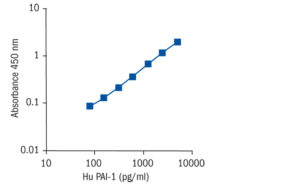PAI-1 Human ELISA
Plasminogen activator inhibitor-1 (PAI-1) is the primary inhibitor of plasminogen activators in plasma, rapidly inactivating both tissue plasminogen activator (t-PA) and urokinase-type plasminogen activator (u-PA). PAI-1 is a single-chain glycoprotein with a molecular weight of 47 kilodaltons. During fibrinolysis, tissue plasminogen activator (tPA) converts the inactive protein plasminogen into plasmin which plays a critical role in fibrinolysis by degrading fibrin and providing localized protease activity in a number of physiological functions. PAI-1 is synthesized in the liver and by endothelial cells, and its synthesis is regulated by several physiologic mediators, including endotoxin, interleukin-1, fibroblast growth factor-2, and lipids. Plasminogen activator inhibitor-1 is an important inhibitor of the fibrinolytic system, so elevated levels could suppress fibrinolysis and result in an increased risk of thrombosis. Increased PAI-1 levels have been shown to be associated with a number of atherosclerotic risk factors, PAI-1 has been shown to act as a prothrombic factor in both arterial and venous thromboembolic disorders. Increased levels of PAI-1 are associated with an increased incidence of acute coronary syndrome. PAI-1 levels are also increased in patients with chronic and acute coronary artery disease (CAD) and in patients who suffer restenosis after coronary angioplasty.
Research topic
Energy metabolism and body weight regulation, Others
Type
Sandwich ELISA, Biotin-labelled antibody
Applications
Serum, Plasma-EDTA, Plasma-Heparin, Plasma-Citrate, Cell culture supernatant
Sample Requirements
50 µl (1:50 prediluted)
Storage/Expiration
Store the complete kit at 2–8°C. Under these conditions, the kit is stable until the expiration date (see label on the box).
Calibration Curve

Calibration Range
78–5000 pg/ml
Limit of Detection
29 pg/ml
Intra-assay (Within-Run)
CV = 4.7%
Inter-assay (Run-to-Run)
CV = 5.0%
Spiking Recovery
58,70%
Dilutation Linearity
98,70%
– Lopez-Legarrea P, de la Iglesia R, Abete I, Navas-Carretero S, Martinez JA, Zulet MA. The protein type within a hypocaloric diet affects obesity-related inflammation: the RESMENA project. Nutrition. 2014 Apr;30 (4):424-9

